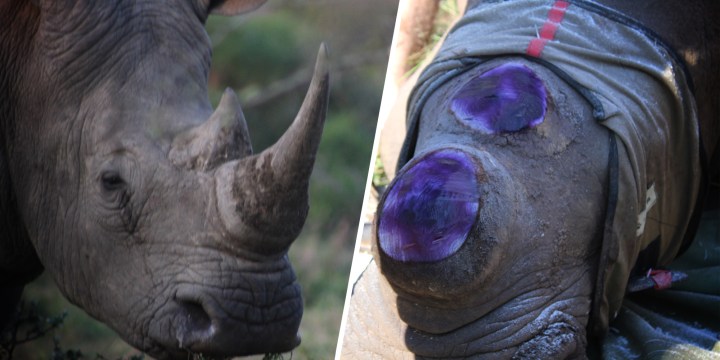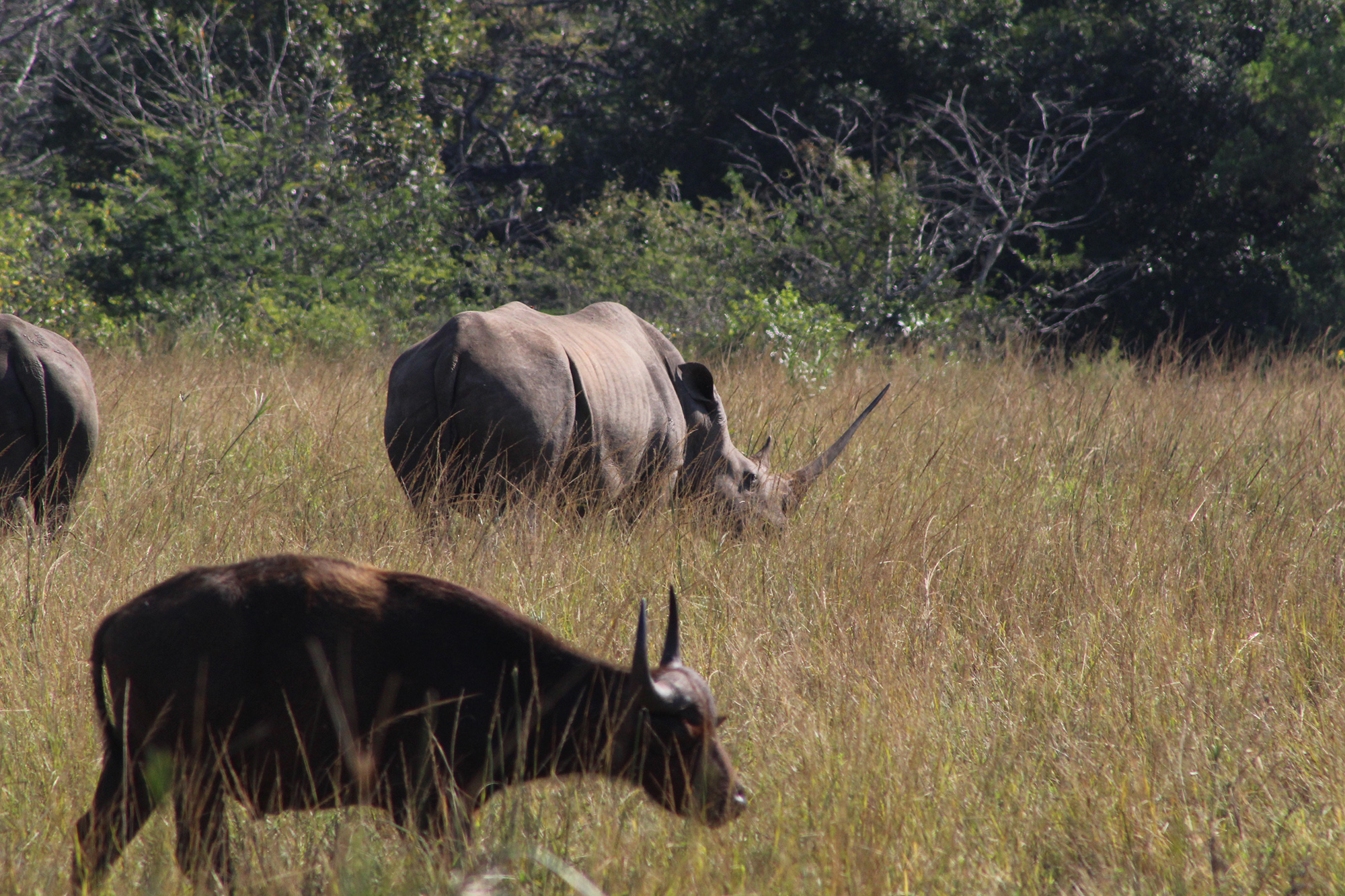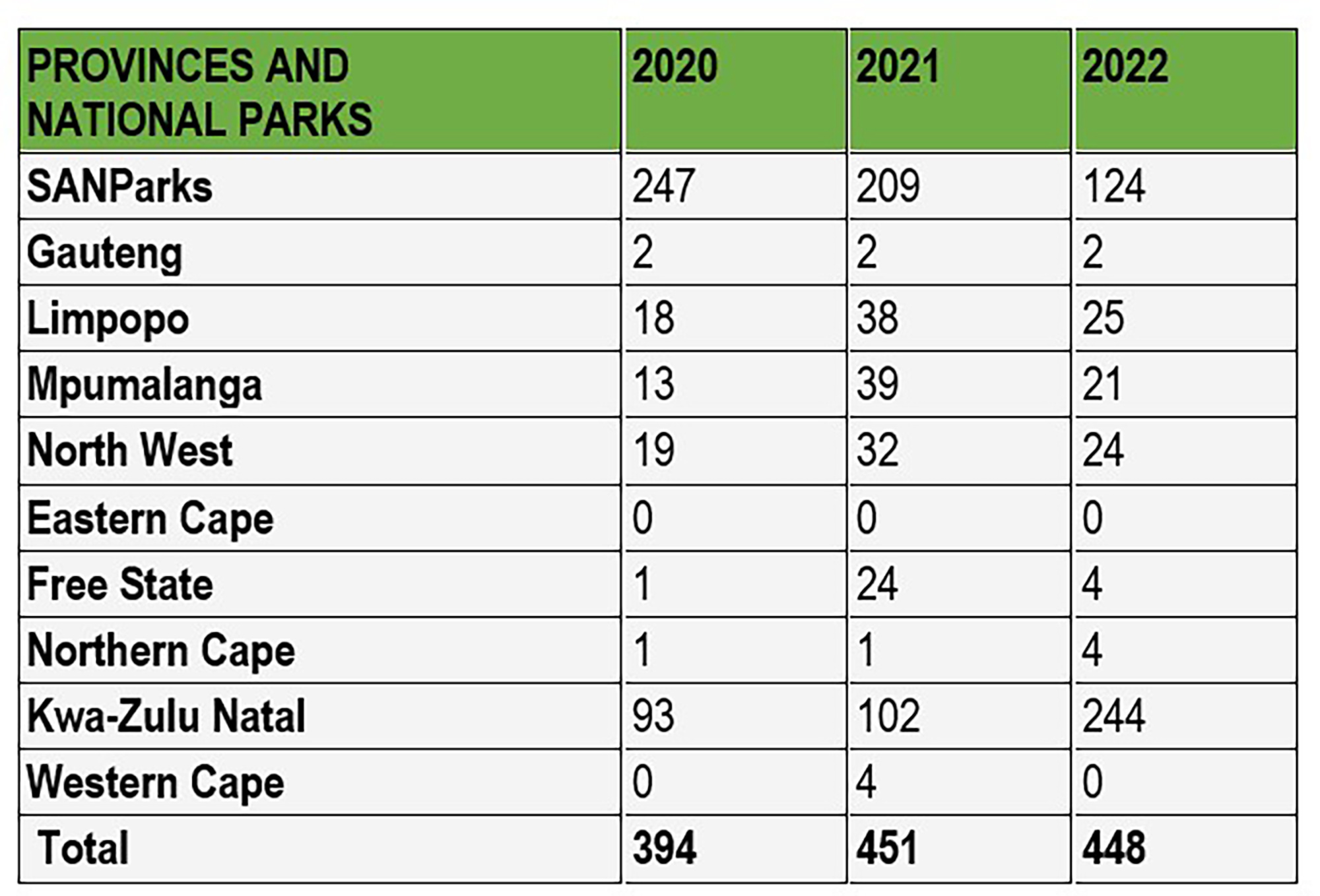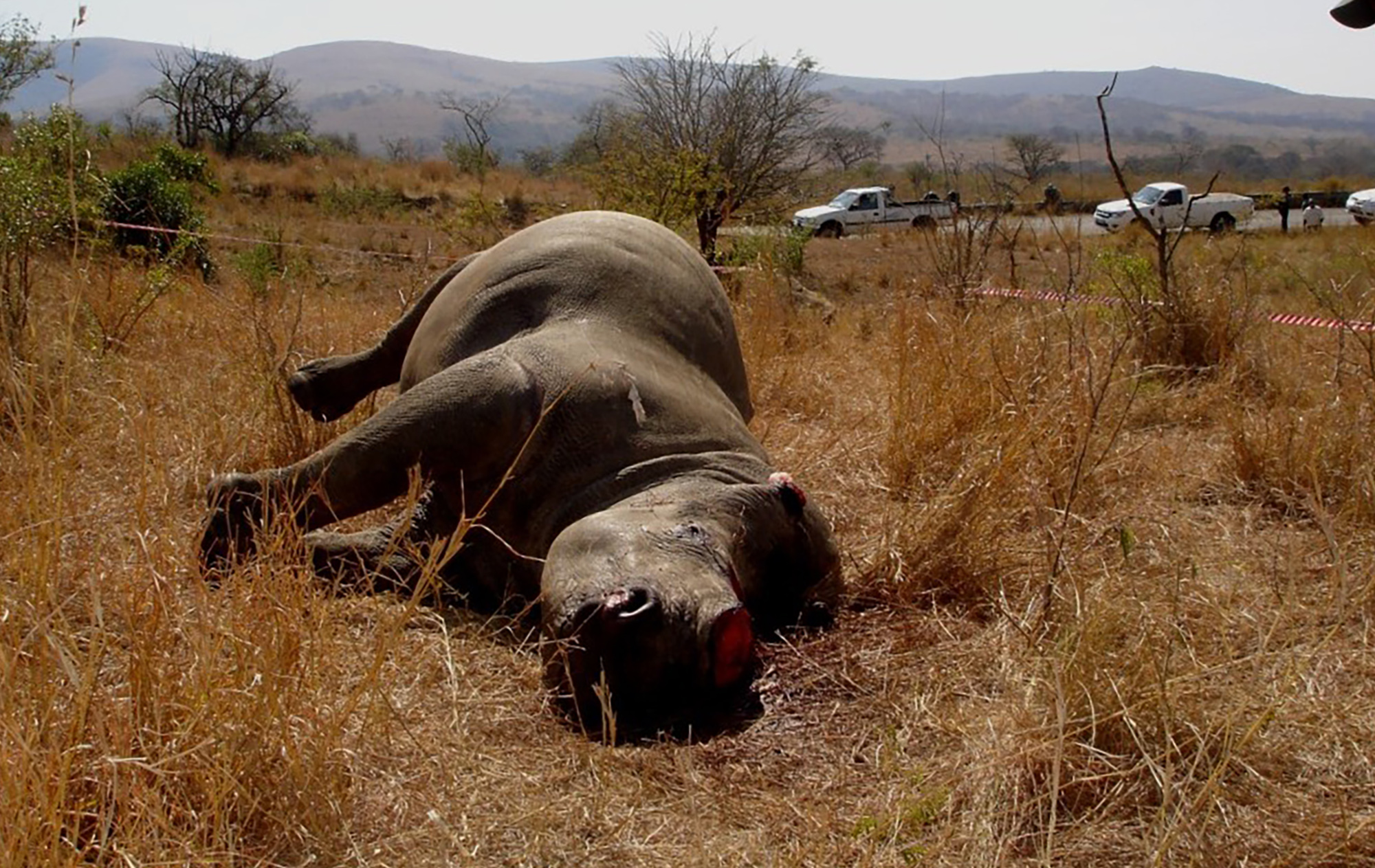HORNS OF DEATH
Ezemvelo conservation agency reviews ‘desperation dehorning’ as rhino bloodbath hits KwaZulu-Natal

The Ezemvelo KZN Wildlife conservation agency has, up till now, opted to not dehorn its rhinos to protect them from poachers. But that could change soon, following another year of relentless killings in which the Hluhluwe-iMfolozi Park emerged as the current rhino poaching hotspot, globally.
The Hluhluwe-iMfolozi Park in KwaZulu-Natal is one of the last places in Africa where local and foreign wildlife lovers can see wild rhinos — with their magnificent horns still attached to their heads.

Ezemvelo’s resistance to de-horning has also been based partly on the position that local and foreign tourists would prefer to see wild rhinos with their horns intact. (Photo: Tony Carnie)
On a recent drive through the park, this writer saw 14 rhinos in just two hours, all with the fully grown horns they use to drive off predators, protect their calves and combat territorial rivals.
Unlike most private parks and many other conservation agencies, the Ezemvelo KZN Wildlife conservation agency has opted to not dehorn its rhinos as a desperate measure to protect them.
But that could change soon, following another year of relentless killings in which the Hluhluwe-iMfolozi Park (HIP) has emerged as the current rhino poaching hotspot, globally. Covering just 96,000 hectares, the HIP is considerably smaller than the two million-hectare Kruger National Park. But last year, the number of rhinos killed in KZN was close to double that of Kruger.
The latest poaching figures released by national Environment Minister Barbara Creecy show that 244 rhinos were killed by horn poachers in KwaZulu-Natal in 2022 — the vast majority of them in the HIP.
By comparison, 124 rhinos were killed in Kruger, a park that was once home to more than 11,000 rhinos, but whose population has plummeted to somewhere around 2,500 over roughly a decade.

A table showing the latest rhino poaching statistics – Source: Department of Forestry, Fisheries and Environment.
Overall, 448 rhinos were slaughtered nationwide during 2022 (see table) a slight decline (of three) compared with the 451 rhinos poached nationally in 2021. By comparison, more than 1,000 rhinos were poached every year in South Africa between 2013 and 2016.
Now, with the Kruger rhino horn larder stripped almost bare, criminal syndicates have been hitting the HIP harder than ever.
As one of the oldest game reserves in Africa, the HIP is also regarded as the cradle of rhino conservation, a refuge where the last remnant population of southern white rhino was rescued from extinction in the late 1870s and later served to repopulate Kruger and other reserves that had lost all their white rhinos to hunters and poachers.
In a media statement on 6 February, Creecy suggested: “The steady decline in rhino poaching in national parks is related to the relentless war that has been waged by our fearsome anti-poaching machinery as well as a comprehensive dehorning programme [emphasis added].
“We believe that if provincial authorities in KwaZulu-Natal follow our model, they will be able to significantly curb rhino poaching in their provincial parks before it is too late,” she said.
A desperate measure to discourage poachers
At a time when most private and state rhino reserves have opted to dehorn their rhinos in a desperate measure to discourage poachers, Ezemvelo has also dehorned its rhinos in smaller reserves — but has so far resisted dehorning its iconic HIP population (a measure which involves immobilising rhinos with drugs every two to three years to allow conservation officials and veterinary experts to trim off the bulk of a rhino’s horns with miniature chainsaws). The rationale is that poachers are less inclined to hunt rhinos with small remnant horn stumps.
Apart from the expenses associated with repeated dehorning, Ezemvelo’s resistance to dehorning has also been based partly on the position that local and foreign tourists would prefer to see wild rhinos with their horns intact.

Another poached rhino lies dead in the Hluhluwe-iMfolozi Park. This animal was killed in the park’s Corridor section in 2014. (Photo: Ezemvelo KZN Wildlife)
Ezemvelo’s wildlife protection budget has shrunk dramatically over recent years, while the agency has also been plagued by a series of leadership crises and financial controversies.
Responding last night to Creecy’s comments, Ezemvelo spokesperson Musa Mntambo confirmed that the dehorning option was back on the table, although no final decision had been taken.
“Ezemvelo will continue to consider dehorning. This consideration involves assessing the financial implications or impact in terms of both conservation and ecotourism.
“Once we have decided what to do, we shall engage all relevant stakeholders to further engage on the matter. At the moment we do not know what will be the final decision.”
In her latest statement on the national rhino poaching crisis, Creecy noted that 132 people were arrested in 2022 for rhino poaching (23 in the Skukuza area in Mpumalanga, 49 in KwaZulu-Natal and the balance in Limpopo).
“The recent focus on money laundering and international cooperation with other law enforcement authorities saw the arrest of 26 rhino horn traffickers and 13 people for money laundering and bribing of rangers.
“To support anti-poaching efforts in KwaZulu-Natal, special interventions were introduced in collaboration with the Department of Forestry, Fisheries and the Environment (DFFE), non-governmental organisations and the South African Police Service (SAPS), which resulted in four key arrests of syndicate members who were focusing their illegal efforts in KwaZulu-Natal. These agencies will continue to collaborate this year.”
Organised crime networks
Responding to the release of the latest rhino poaching statistics, the WWF South Africa conservation group said: “Transparency and regular communication about rhino numbers and rhino poaching are vital to understand the threats to our rhinos and the best solutions to conserve them.
“The most recent rhino population numbers for Africa to the end of 2021, as released by IUCN [International Union for Conservation of Nature] last year, showed that white rhino numbers have continued to decline at around 3.1% per year and numbered just below 16,000 animals.
“We note with concern that the organised crime networks orchestrating the trafficking of rhino horns continue to move their targets on to important rhino populations in large conservation areas across southern Africa. Of specific concern is the… ongoing rhino poaching pressure in KwaZulu-Natal.”
WWF noted the reported benefits of active dehorning programmes in Kruger National Park in shifting the risk/reward to criminals involved in rhino poaching.
“Dehorning has also been recognised as an important security intervention in the private reserves forming part of the WWF Black Rhino Range Expansion Project in KwaZulu-Natal and Limpopo.”
WWF also highlighted the importance of targeting criminal underworld leaders rather than foot-soldier poachers.
“The Wildlife Justice Commission 2022 Global Threat Assessment into rhino horn trafficking from 2012-2021 identified irrefutable evidence pointing to the involvement of transnational organised criminal networks.
Visit Daily Maverick’s home page for more news, analysis and investigations
“The report called for in-depth, intelligence-led investigations that focus on the criminal networks rather than individuals, conducting further investigations after seizure incidents to identify the product owners, using advanced investigation techniques, conducting parallel financial or corruption investigations, and seizing assets.”
It also hailed a recent integrated take-down operation dubbed Blood Orange and conducted in Mpumalanga, Gauteng and Limpopo by the Hawks, SAPS, Mpumalanga Serious Corruption Investigation, Serious Organised Crime Investigation and Serious Commercial Crime Investigation, Crime Intelligence, Tactical Response Team and Local Criminal Record Centre, KPMG, DFFE and South African National Parks (SANParks).
“This operation led to successful arrests of former SANParks rangers and family members for their involvement in serious organised crimes relating to rhino horn trafficking, including money laundering.
“Such collaboration between local law enforcement and prosecution agencies not only disrupts rhino poaching networks but also promotes broader safety and security for people throughout the landscape.
“Over the last year, there has also been growing recognition of the importance of professionalising rangers working on the front line of conservation efforts. Valuing the critical work by rangers and building morale and trust within teams can also prevent transnational organised crime networks from corrupting staff to gain information and access to rhinos.” DM/OBP






















 Become an Insider
Become an Insider
Ezemvelo are asleep at the wheel! This is insane. It’s clear as day that poaching will move into an area where there are abundant Rhino in a relatively unprotected area such as HIP. In 2021 I saw literally 100 Rhino in a matter of days and marvelled at how the community must have been protecting these animals and that KZN/Ezemvelo wildlife must be doing something right and wondered what it could be. How naïve of me. What did Ezemvelo expect would happen when you can’t even find a Rhino in KNP? Obviously the business of poaching would turn to them.
The fact that they are choosing to keep the Rhino horned, when standard industry practice is to dehorn, makes me deeply suspicious that the decision makers at Ezemvelo have ties to organised crime and will be receiving a kick back from all of this. Particularly considering all the boardroom nonsense at Ezemvelo over the last 24 months that DM has been writing about.